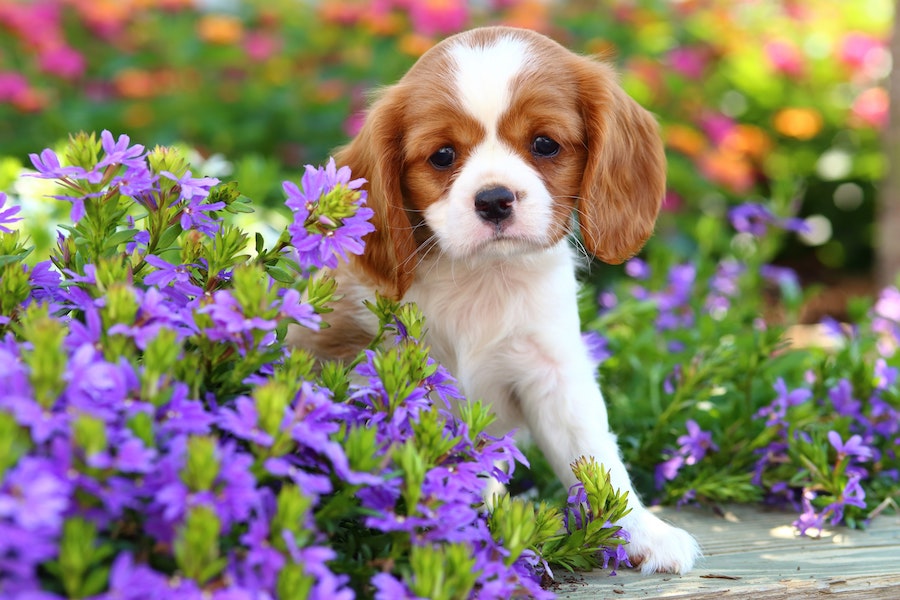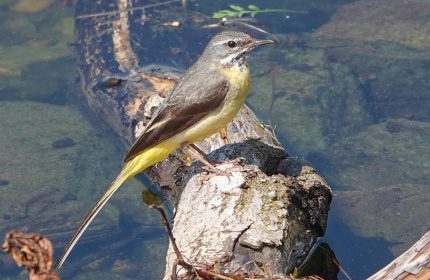How to make your garden dog-friendly
So often, pets are considered a bit of a nuisance among gardeners, who don’t really appreciate their lawn being dug up by pooches burying their bones, or bounding through their flowerbeds.
But award-winning Chelsea designer Sam Ovens, a dog owner himself, is adamant gardeners and their pets can share outdoor space in harmony.

Don’t let the dog dig up your lawn
He’s teamed up with the Animal Health Trust (aht.org.uk) to share top tips on how you too can create a dog-friendly garden for your pooch…

Designer Sam Ovens is creating a dog-friendly garden at Chelsea
What plants may be beneficial to dogs and stimulate interest on all sides?
Ovens suggests: “For me, a dog-friendly garden can be beautiful – dogs love to explore and I think actually a plant-filled garden is great place to investigate and play.

Pennisetum is a good choice for dogs
“Care just needs to be taken to ensure the plant selection is robust and will bounce back when our doggy friends decide to take short cuts across the borders!
“Choose robust plants, as well as ornamental grasses like miscanthus and pennisetum, but in any case, beware of spikes and thorns, particularly at eye level,” he adds. “For something both dog and owner can enjoy, plant herbs like oregano, fennel and nepeta, all good, safe choices.”
Which design ideas could be incorporated into a dog-friendly space?

Give your dog some shade
“Dogs will enjoy a shady spot for those hot summer days, and different textures, from paving and grass to cobbles and mulch. Also, a clear path around or through the garden space for the dog to run around, fresh water to keep dogs hydrated and cool, but with shallow sloping edges so they can easily get in and out, and herbs and other scented plants that smell great,” says Ovens.
Anything to avoid that’s likely to be trashed by a boisterous dog?

Plant larger, more robust plants if you have a boisterous dog
“Boisterous dogs can damage young and delicate plants, either by digging them up or running through them. It’s best to avoid small and delicate plants that are slow growing, as these will struggle to recover from the rough and tumble of dog play,” says Ovens. “Planting larger and more established plants than normal is also wise, as established plants are more resilient.”
Any features both dog and human can enjoy in unison?

Water can be calming for both gardener and dog
“I think sensory elements are great, as they are stimulating for both man and dog,” he suggests. “A simple water feature set among planting can provide a natural sound that’s as calming for dogs as it is for us. It’s also a source of water for thirsty dogs, as well as an attractive thing to sit and watch.”
Other elements enjoyable to human and dog include scented plants, as well as natural sounds from ornamental grasses and bamboo, which create a calming environment.
What else should you avoid in a dog-friendly garden?
Heather Covey, head of internal medicine at the AHT small animal clinic, advises: “When planning a garden, remember that our dogs are great scavengers and can find a number of things to eat, many potentially dangerous to your dog.
“Certain plants, such as foxgloves and delphiniums, are toxic. Be careful with bulbs which can be dug up and eaten, as these can cause stomach upsets and in some cases severe irritation of the mouth and throat.
“Make sure your dog doesn’t eat snails and slugs, as these can cause lung worm (a serious condition in your dog) and instead of using slug pellets, use the old remedies for slug prevention, such as eggshells and copper tape.

Don’t let your dog eat snails
Don’t forget about your compost heap, she adds.
“This can contain food scraps, such as avocados, grapes and onions which, although may be tempting to your pet, can be harmful.
“Your compost heap can also contain mould toxins, which if ingested can have worrying neurological or liver side-effects. If you want to compost at home, then a sealed bin is a good idea. Finally, if an owner is concerned about their animal’s health, they should always consult their vet.”
The Press Association
Latest posts by The Press Association (see all)
- Best places to see bluebells this spring - April 2, 2025
- Does sunscreen expire? Everything you need to know about SPFs - April 2, 2025
- Top Gun and Batman star Val Kilmer dead at 65 - April 2, 2025
- Actor Richard Chamberlain dies aged 90 - March 30, 2025
- 5 new books to read this week - March 26, 2025




















